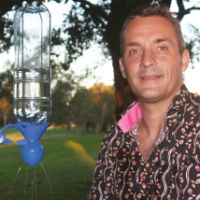What was life like pre SpaTap?
When I was younger in India, I saw a tap that was used by the whole village. The tap was broken and I was shocked to learn 30 families shared this tap.
Years later, I learnt about the fantastic water projects the giant charities are implementing in Africa and across Asia but still noticed that most of the communities serviced didn't have mains water plumbed in. This leads to people sharing dirty faucets and the spread of communicable disease.
Where did the idea for SpaTap come from and what are its main uses?
After a move to Australia, one day I was working on my car and my hands were dirty, I noticed how a bottle of water in my car had become incredibly hot and wondered how could I make this more efficient and provide a proper wash out of this free hot water?
I fused all of my past working experiences and passions together and eureka! SpaTap was born and brought to market in November 2014.
For the last two years there has been ongoing field research and testing of prototypes and SpaTap is now helping in many disaster relief areas and also in African schools.
SpaTap beat 470 entrants to win Standard Bank's Water4Africa 2015 award and managed to get Dragon interest but not their cash. What did the Standard Bank judges see in SpaTap that the Dragons didn't?
I don't think the Dragons have ever seen what life is like in disaster zones, refugee camps or even domestic campsites for that matter. They may have underestimated how big the market is and how SpaTap can help millions of people. I am glad they didn't invest as I think working with these guys could come with a lot of strings attached.
Can you run a commercial concern and a humanitarian project side by side?
Yes, in fact the humanitarian market is bigger than any domestic commercial market and this is what keeps me going in the morning. We have projects set up in developing countries and in places closer to home like Calais.
Right now newborn babies are being washed with spataps in refugee camps. Doctors in the Congo are using them to wash before surgery, soldiers in Afghanistan take them as part of their kit. We know how powerful this little tool is. Now it's just a case of getting SpaTap the exposure it deserves.
Where has SpaTap made the biggest difference and how do you see the business evolving over the next 2-5 years?
Our project in Kenyan schools for example is ongoing and anyone can feel free to donate to it.
Before SpaTap, 342 children, one dirty faucet, carrying water for two hours to fill up an oil drum and high chances of cross contamination of communicable disease.
After SpaTap, 342 children, 342 SpaTaps, no more sharing a tap! This saves enormous amounts of water and minimalises cross contamination of communicable disease.
We see the long term usage of SpaTap exploding, becoming part of everyday life and a household name. Since we aired on the Dragons' Den we have been contacted by campers, festival goers, armed forces medics, muslims for the ablutions rituals before prayer, schools, truck drivers and aid agencies. The list goes on. Everyone needs SpaTap!






